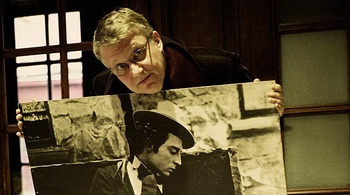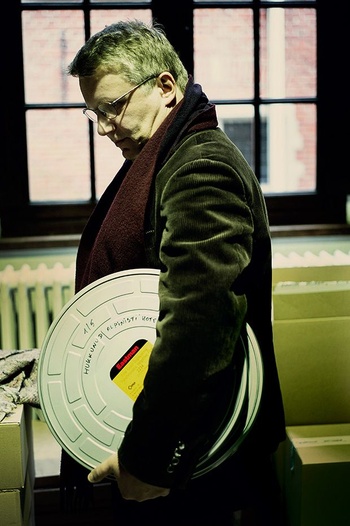(© Ivan Put)
The Royal Belgian Film Archive was founded 75 years ago, and that is being celebrated as far afield as New York, where the Museum of Modern Art (MoMA) recently paid tribute to our Cinematek. In Brussels, the festivities are being kicked off this weekend. “We are not focused on the past, we spend every day working for the future,” curator Nicola Mazzanti tells us.
With the arrival of Nicola Mazzanti in January 2012, an international expert in film conservation became head of the Royal Belgian Film Archive. The 50-year-old Italian is one of the driving forces behind the festival Il Cinema Ritrovato, he has restored hundreds of films, established a new film conservation centre at the University of Los Angeles, and he advises European commissioners on the digitisation of European film heritage. Mazzanti is only the third curator in the history of Cinematek. He follows in the footsteps of Jacques Ledoux who made the archive prominent, and Gabriëlle Claes, who gave it permanence.
Cinematek has been in the news a few times over the past few years because of its financial troubles. What is the current situation?
Nicola Mazzanti: For an institution of national importance, Cinematek is under-funded. We manage the country’s film heritage and administer one of the most important collections in the world. That is a claim every film archive makes, but in our case it is actually true. We are the most important or second most important film archive in Europe. Our budget, however, is comparable to that of Luxemburg. But we make the best of what we’ve got, as we always have.
Is it possible to continue along the same course now that digitisation has so profoundly redrawn the map?
Mazzanti: We are currently in a transitional phase. From my perspective, the transformation is not a technical issue. The more significant issue is that the old business model (production-distribution-screening) has been in a crisis for a number of years without a new business model being proposed. It is now that one ought to invest. Now that all the cinemas have been equiped for digital cinema projection, we are faced with a choice: either we do nothing, or we digitise the collection so that our films can still be screened elsewhere. This is also a fine opportunity to publicise our film heritage. By digitising the collection, we can make thousands of hours of documentary and current affairs footage on Belgian and international subjects available to the general public. It’s not that we’re doing nothing, though. Our lab, which has been restoring analogue films since the late 1970s, has an excellent reputation worldwide. We already have the structure required to digitise and to store digital film.
Has the best method of storing digital film been discovered?
Mazzanti: Yes and no. The mothers of all film archives – London, Paris, New York, Berlin, Brussels – were founded in the second half of the 1930s, when people did not yet know how to conserve film. We only learned that over the course of time. This is not the first big change we’ve been confronted with; just think of the transition from silent film to talkies.
It was only in the early 1990s that a theory of film restoration was first proposed. And I am faced now with the reality that what I wrote then has
75 years Cinematek: celebrating the future of film


become completely worthless. [Laughs] Digitisation has changed all the paradigms.
Conserving digital films is one thing, you also have to be able to keep screening them. Just think of all those Word documents that are five years old and you can’t get them to open anymore. We don’t want that to happen with the whole film archive. The constantly changing formats are a problem. But we’re not facing the challenge alone. How best to store digital information is a concern shared by the medical world, banks, space agencies, governments, and administrations, you name it.
It is striking that so little has been written or documented about the history of Cinematek.
Mazzanti: No film archive has ever produced great literature. One little book with basic information was written to celebrate our 50th birthday and a few theses have been written about us. [Points over to the wall] See those boxes? I dug up our archive. We should indeed write our story down. I had a dream that it would be done this year, but it will definitely take longer. It’s important to see the bigger picture. This institution is not only important to Belgium. People ought to know that the concept of a film archive as we now know it was heavily influenced by the Royal Belgian Film Archive.
The collection’s importance is always expressed in figures: 71,000 titles. But could you give us some examples of important titles? Do you know the collection well?
Mazzanti: I am getting to know to it. We’re always making new discoveries. We recently found Beware, My Lovely, a B-movie starring Ida Lupino. Apparently there are no good copies of that film left in the States. And that instantly makes it a rare piece. During the Ghent Film Festival we screened La jetée [a pivotal sci-fi film – NR] by Chris Marker. It’s the first edit of the film, and we own the only copy. For Gabriel Over the White House the MoMA had to come to us. Our copy was crucial to the restoration of Citizen Kane. We have negatives of the silent films of Ernst Lubitsch. Das Cabinet des Dr. Caligari in colour. Our collection is almost twice the size of the one in Paris. Let me tell you a story. In the 1920s, Bertolt Brecht made Mysterien eines Friseursalons, starring Karl Valentin. In 1990, the Bologna Film Festival presented that mythical film. A copy had been found in Russia. Everyone raved about this great discovery. And you know what? Belgium has had a copy since 1967. While the rest of the world dreamt of being able to see that film, it was on the programme every few years here. Typical.
What will Cinematek look like after the next 75 years?
Mazzanti: I have no idea. I hope it doesn’t differ too significantly from Cinematek today. I hope we will have proved able to conserve all the films of yesterday, tomorrow, and all the following years.
Our obsession is to safeguard films for the future. We are not focused on the past, we spend every day working for the future. I also hope that by then, the collection will be easily available to everyone. We are now digitising all our films about the First World War. That shouldn’t take us 75 years, although with our current budgets you never know. [Laughs]
75 YEARS CINEMATEK • > 31/12, Verschillende locaties/Divers lieux/Various venues & Cinematek, rue Baron Hortastraat 9, Brussel/Bruxelles, www.cinematek.be
Conserving digital films is one thing, you also have to be able to keep screening them. Just think of all those Word documents that are five years old and you can’t get them to open anymore. We don’t want that to happen with the whole film archive. The constantly changing formats are a problem. But we’re not facing the challenge alone. How best to store digital information is a concern shared by the medical world, banks, space agencies, governments, and administrations, you name it.
It is striking that so little has been written or documented about the history of Cinematek.
Mazzanti: No film archive has ever produced great literature. One little book with basic information was written to celebrate our 50th birthday and a few theses have been written about us. [Points over to the wall] See those boxes? I dug up our archive. We should indeed write our story down. I had a dream that it would be done this year, but it will definitely take longer. It’s important to see the bigger picture. This institution is not only important to Belgium. People ought to know that the concept of a film archive as we now know it was heavily influenced by the Royal Belgian Film Archive.
The collection’s importance is always expressed in figures: 71,000 titles. But could you give us some examples of important titles? Do you know the collection well?
Mazzanti: I am getting to know to it. We’re always making new discoveries. We recently found Beware, My Lovely, a B-movie starring Ida Lupino. Apparently there are no good copies of that film left in the States. And that instantly makes it a rare piece. During the Ghent Film Festival we screened La jetée [a pivotal sci-fi film – NR] by Chris Marker. It’s the first edit of the film, and we own the only copy. For Gabriel Over the White House the MoMA had to come to us. Our copy was crucial to the restoration of Citizen Kane. We have negatives of the silent films of Ernst Lubitsch. Das Cabinet des Dr. Caligari in colour. Our collection is almost twice the size of the one in Paris. Let me tell you a story. In the 1920s, Bertolt Brecht made Mysterien eines Friseursalons, starring Karl Valentin. In 1990, the Bologna Film Festival presented that mythical film. A copy had been found in Russia. Everyone raved about this great discovery. And you know what? Belgium has had a copy since 1967. While the rest of the world dreamt of being able to see that film, it was on the programme every few years here. Typical.
What will Cinematek look like after the next 75 years?
Mazzanti: I have no idea. I hope it doesn’t differ too significantly from Cinematek today. I hope we will have proved able to conserve all the films of yesterday, tomorrow, and all the following years.
Our obsession is to safeguard films for the future. We are not focused on the past, we spend every day working for the future. I also hope that by then, the collection will be easily available to everyone. We are now digitising all our films about the First World War. That shouldn’t take us 75 years, although with our current budgets you never know. [Laughs]
75 YEARS CINEMATEK • > 31/12, Verschillende locaties/Divers lieux/Various venues & Cinematek, rue Baron Hortastraat 9, Brussel/Bruxelles, www.cinematek.be
Read more about: Film, Events & Festivals
Fijn dat je wil reageren. Wie reageert, gaat akkoord met onze huisregels. Hoe reageren via Disqus? Een woordje uitleg.